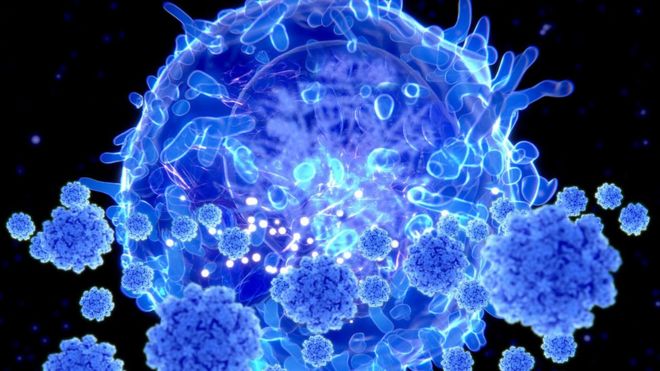冠状病毒:免疫力可能比测试的所表明的更加广泛

People testing negative for coronavirus antibodies may still have some immunity, a study has suggested.
研究表明,对冠状病毒抗体检测呈阴性的人可能仍具有一定的免疫力。
For every person testing positive for antibodies, two were found to have specific T-cells which identify and destroy infected cells.
对于每个抗体检测呈阳性的人,发现其中两个都有特定的T细胞,这种T细胞可以识别并破坏感染的细胞。
This was seen even in people who had mild or symptomless cases of Covid-19.
即使在患有轻度或无症状的Covid-19病例的人中也能看到这一点。
But it’s not yet clear whether this just protects that individual, or if it might also stop them from passing on the infection to others.
但是,目前尚不清楚这是否只是在保护那个人,或者也可能阻止他们将感染传递给他人。
Researchers at the Karolinksa Institute in Sweden tested 200 people for both antibodies and T-cells.
瑞典Karolinska研究所的研究人员测试了200人的抗体和T细胞。
Some were blood donors while others were tracked down from the group of people first infected in Sweden, mainly returning from earlier affected areas like northern Italy.
这些人中,其中一些是献血者,而另一些则是从最初在瑞典受感染的人群中找到的,主要是从较早受影响的地区(如意大利北部)返回的。
This could mean a wider group have some level of immunity to Covid-19 than antibody testing figures, like those published as part of the UK Office for National Statistics Infection Survey, suggest.
这可能意味着,与抗体测试数据相比,更广泛的人群对Covid-19的免疫力更高,例如英国国家统计局感染调查办公室发布的数据。
那些人可能确实发起了抗体反应,但抗体已经消失或在当前测试中无法检测到。
And these people should be protected if they are exposed to the virus for a second time.
如果这些人第二次接触该病毒,则应该受到保护。
Prof Danny Altmann at Imperial College London described the study as “robust, impressive and thorough” and said it added to a growing body of evidence that “antibody testing alone underestimates immunity”.
伦敦帝国理工学院的丹尼·阿尔特曼教授将这项研究描述为“有力,令人印象深刻且透彻”,并说这增加了越来越多的证据表明“仅进行抗体检测会低估免疫力”。
Herd immunity
群体免疫
This doesn’t necessarily get us any closer to herd immunity, though, according to assistant professor Marcus Buggert, one of the study’s authors.
该研究的作者之一助理教授马库斯·布格特(Marcus Buggert)表示,这并不一定使我们更接近群体免疫。
More analysis needs to be done to understand whether these T-cells provide “sterilizing immunity”, meaning they completely block the virus, or whether they might protect an individual from getting sick but not stop them from carrying the virus and transmitting it.
需要做更多的分析来了解这些T细胞是否提供“杀菌免疫力”,这意味着它们完全阻断了病毒,或者它们是否可以保护个人免患病,但不会阻止他们携带病毒并传播病毒。
Much of the discussion around Covid-19 immunity has focused on antibodies – Y-shaped proteins which act like “missiles shooting down a target”, assistant Prof Buggert explained.
助手Buggert教授解释说,围绕Covid-19免疫力的许多讨论都集中在抗体-Y形蛋白上,它们像“导弹击落目标”一样起作用。
They bind to the virus before it can enter your cells, and neutralize it.
它们会与病毒结合,然后才能进入您的细胞并中和。
If antibodies fail to neutralize the virus, it can enter your cells and turn them into virus-making factories.
如果抗体无法中和病毒,它可以进入您的细胞并将其转变为制造病毒的工厂。
T-cells, on the other hand, target already-infected cells and completely destroy them, stopping them from spreading to other, healthy cells.另一方面,T细胞靶向已感染的细胞并完全破坏它们,阻止它们扩散到其他健康细胞。

One thought on “Coronavirus: Immunity may be more widespread than tests suggest”